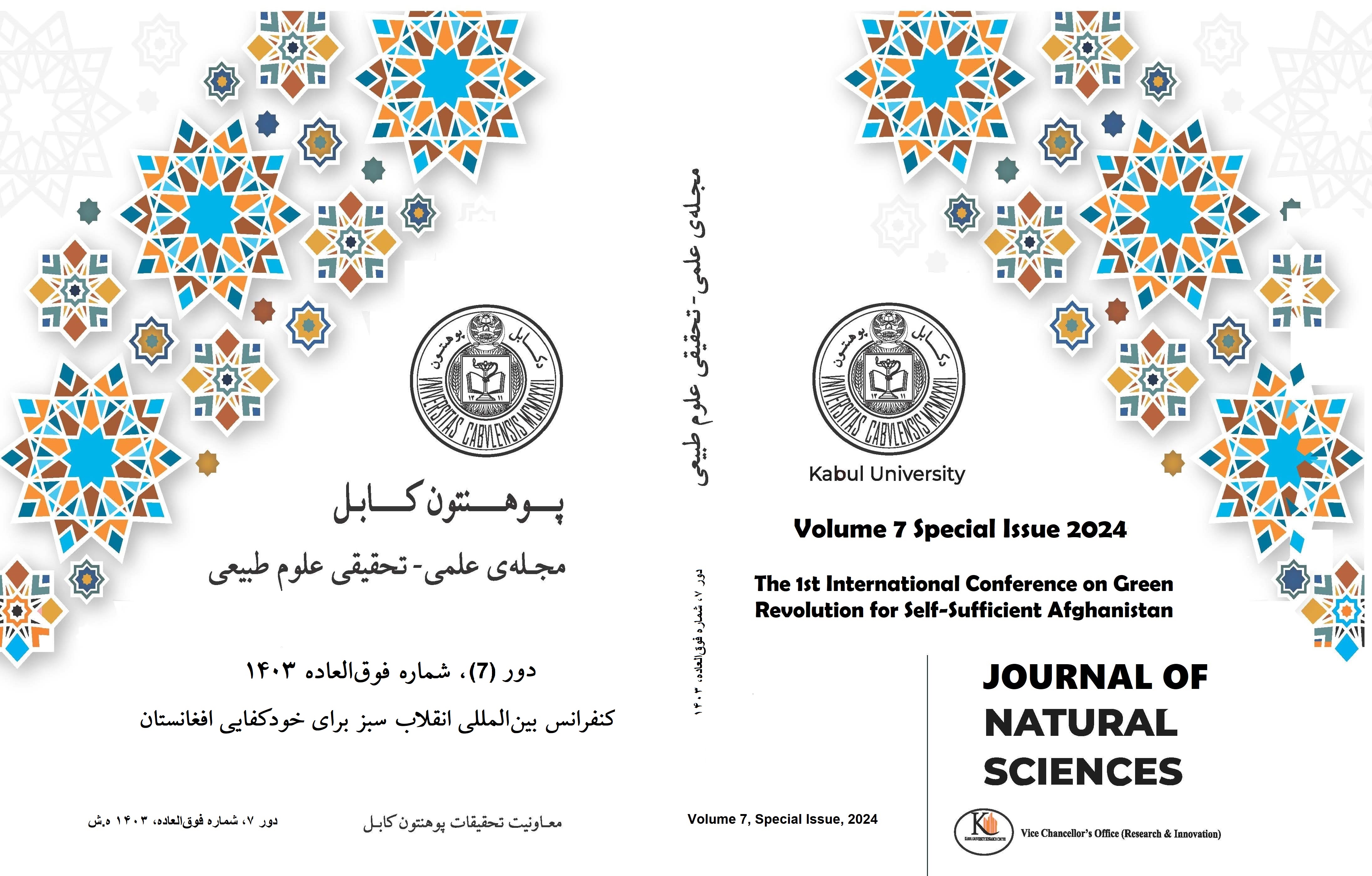Main Article Content
Abstract
Afghanistan is recognized as an agricultural country, with approximately 80% of its population reliant on agriculture for their livelihoods. However, decades of conflict and a growing population have significantly hindered Afghanistan's agricultural productivity, leaving the country heavily dependent on imports for nearly all agricultural products. Water is one of Afghanistan's most vital natural resources and plays a crucial role in the development of agriculture and livestock. Afghanistan possesses an annual water resource of 75 billion cubic meters. Yet, a large portion of this water—approximately 37 billion cubic meters—flows freely to neighboring countries without being utilized, while only 20 billion cubic meters are used domestically. Unfortunately, Afghanistan is not self-sufficient in food production, necessitating the development of strategies to produce food locally. The country has abundant natural resources, including land, water, and favorable climatic conditions, which, if effectively managed, could pave the way toward food self-sufficiency. The primary objective of this study is to examine the Qosh Tepa Canal, its characteristics, and its economic benefits. Data for the study were gathered from technical reports and scholarly articles using a library-based research method.
Keywords
Article Details
Copyright (c) 2024 Copyright Reserved for Kabul University

This work is licensed under a Creative Commons Attribution-NonCommercial 4.0 International License.
References
- AACS Consulting, & BETS Consulting. (2019). Economic and financial analyses report for Khush Tepa irrigation scheme and power generation (KTISPG) feasibility study.
- AACS Consulting, & BETS Consulting. (2019, December 23). Feasibility study report (Volume I), Khush Tepa irrigation scheme and power generation (KTISPG) feasibility study project. Kabul, Afghanistan.
- AACS Consulting, & BETS Consulting. (2019). Gender analysis report: Gender perspectives and gender participation, Khush Tepa irrigation scheme and power generation (KTISPG) project.
- AACS Consulting, & BETS Consulting. (2019). Soil and land classification report, Khush Tepa irrigation scheme and power generation (KTISPG) feasibility study project.
- AACS Consulting, & BETS Consulting. (2019). Report on structure design for Khush Tepa irrigation scheme and power generation (KTISPG) feasibility study.
- AACS Consulting, & BETS Consulting. (2019). Resettlement action plan, Khush Tepa irrigation scheme and power generation (KTISPG) feasibility study project.
- د اوبو او انرژي وزارت. (۱۴۰۲) . تخنیکي راپورونه.
- د چارو لوی ریاست. (۱۴۰۲) . تخنیکي راپورونه.
- د ملي پراختیایي شرکت. (۱۴۰۲) . تخنیکي راپورونه.
- د کرنې، اوبو لګولو او مالدارۍ وزارت .(۲۰۱۹) .د خوش تېپې د کانال د امکان سنجی مطالعاتو راپور.
References
AACS Consulting, & BETS Consulting. (2019). Economic and financial analyses report for Khush Tepa irrigation scheme and power generation (KTISPG) feasibility study.
AACS Consulting, & BETS Consulting. (2019, December 23). Feasibility study report (Volume I), Khush Tepa irrigation scheme and power generation (KTISPG) feasibility study project. Kabul, Afghanistan.
AACS Consulting, & BETS Consulting. (2019). Gender analysis report: Gender perspectives and gender participation, Khush Tepa irrigation scheme and power generation (KTISPG) project.
AACS Consulting, & BETS Consulting. (2019). Soil and land classification report, Khush Tepa irrigation scheme and power generation (KTISPG) feasibility study project.
AACS Consulting, & BETS Consulting. (2019). Report on structure design for Khush Tepa irrigation scheme and power generation (KTISPG) feasibility study.
AACS Consulting, & BETS Consulting. (2019). Resettlement action plan, Khush Tepa irrigation scheme and power generation (KTISPG) feasibility study project.
د اوبو او انرژي وزارت. (۱۴۰۲) . تخنیکي راپورونه.
د چارو لوی ریاست. (۱۴۰۲) . تخنیکي راپورونه.
د ملي پراختیایي شرکت. (۱۴۰۲) . تخنیکي راپورونه.
د کرنې، اوبو لګولو او مالدارۍ وزارت .(۲۰۱۹) .د خوش تېپې د کانال د امکان سنجی مطالعاتو راپور.
